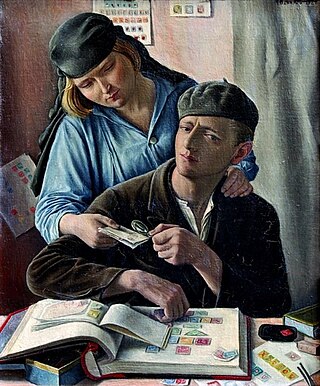
Stamp collecting is the collecting of postage stamps and related objects. It is an area of philately, which is the study of stamps. It has been one of the world's most popular hobbies since the late nineteenth century with the rapid growth of the postal service, as a stream of new stamps was produced by countries that sought to advertise their distinctiveness through their stamps.

A star catalogue is an astronomical catalogue that lists stars. In astronomy, many stars are referred to simply by catalogue numbers. There are a great many different star catalogues which have been produced for different purposes over the years, and this article covers only some of the more frequently quoted ones. Star catalogues were compiled by many different ancient people, including the Babylonians, Greeks, Chinese, Persians, and Arabs. They were sometimes accompanied by a star chart for illustration. Most modern catalogues are available in electronic format and can be freely downloaded from space agencies' data centres. The largest is being compiled from the spacecraft Gaia and thus far has over a billion stars.

Philatelic literature is written material relating to philately, primarily information about postage stamps and postal history.
The Scott catalogue of postage stamps, published by Scott Publishing Company, now a subsidiary of Amos Media, is updated annually and lists all the stamps of the world that its editors recognize as issued for postal purposes. It is published in fourteen large volumes that include twelve volumes containing all the countries of the world that have ever issued postage stamps, the United States Specialized Catalog, and the 1840–1940 Classic Specialized Catalogue. The numbering system used by Scott to identify stamps is dominant among stamp collectors in the United States, Canada and Mexico.
Bliss is a common noun meaning 'extreme happiness'. It may also refer to:

An auction catalog or auction catalogue is inventory of listing of items to be sold at an auction. It is made available some time before the auction date. Auction catalogs for rare and expensive items, such as art, books, jewelry, postage stamps, furniture, wine, cars, posters, published for sales around the world, can be of interest in themselves--they will can include detailed descriptions of the items, their provenance, historical significance, photographs, and even comparative analyses and descriptive essays by subject experts.

A stamp catalog is a catalog of postage stamp types with descriptions and prices.

The Stanley Gibbons Group plc is a company quoted on the London Stock Exchange specialising in the retailing of collectable postage stamps and similar products. The group is incorporated in London. The company is a major stamp dealer and philatelic publisher. The company's philatelic subsidiary, Stanley Gibbons Limited, had a royal warrant of appointment from Queen Elizabeth II.
Nature, in the broadest sense, is the natural, physical, or material world or universe.

The Catalogue is a box set consisting of the eight albums by German electronic music band Kraftwerk that were released from 1974 to 2003. All albums are digitally remastered, with most of the cover art redesigned, including rare photographs in the liner notes that were not part of each album's original release.
A galaxy is an astronomical system that consists of a large number of stars and other matter.
A parade is a procession of people.
Just or JUST may refer to:

A stamp dealer is a company or an individual who deals in stamps and philatelic products. It also includes individuals who sell postage stamps for day to day use or revenue stamps for use on court documents. Stamp dealers who sell to stamp collectors and philatelists are of many kinds and their businesses range from small home operations to large international companies.

Catalogue 2005 is the sixth compilation album by Buck-Tick, released on December 7, 2005. It is an updated, expanded edition of Catalogue 1987–1995 that was released in 1995. However, it does not contain "M・A・D", "Die" or "Mienai Mono o Miyou to Suru Gokai Subete Gokai da". It reached number fourteen on the Oricon chart.

Trade literature is a general term including advertising, customer technical communications, and catalogues.

An astronomical catalog or catalogue is a list or tabulation of astronomical objects, typically grouped together because they share a common type, morphology, origin, means of detection, or method of discovery. The oldest and largest are star catalogues. Hundreds have been published, including general ones and special ones for such objects as infrared stars, variable stars, giant stars, multiple star systems, star clusters, and so forth.
A catalogue number or catalog number may refer to:

US Treasury Department Specimen books, also known as BEP presentation albums, were published by the Bureau of Engraving and Printing (BEP) from the mid-1860s through the 1910s. Prepared upon request of the United States Secretary of the Treasury, albums were generally presented to Cabinet members, select Members of Congress, diplomats and visiting dignitaries. Some extant albums still in their original binding bear the name of the recipient impressed in gold lettering on the cover. While no two presentation albums have exactly the same contents, each book usually contained portraits, vignettes, and/or images of buildings. Specimen books which contain whole proof images of currency are extremely rare.











